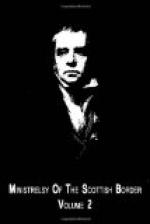The storm, which had been soothed to temporary rest in Scotland, burst forth in England with treble violence. The popular clamour accused Charles, or his ministers, of fetching into Britain the religion of Rome, and the policy of Constantinople. The Scots felt most keenly the first, and the English the second, of these aggressions. Accordingly, when the civil war of England broke forth, the Scots nation, for a time, regarded it in neutrality, though not with indifference. But, when the successes of a prelatic monarch, against a presbyterian parliament, were paving the way for rebuilding the system of hierarchy, they could no longer remain inactive. Bribed by the delusive promise of Sir Henry Vane, and Marshall, the parliamentary commissioners, that the church of England should be reformed, according to the word of God, which, they fondly believed, amounted to an adoption of presbytery, they agreed to send succours to their brethren of England. Alexander Lesly, who ought to have ranked among the contented subjects, having been raised by the king to the honours of Earl of Leven, was, nevertheless, readily induced to accept the command of this second army. Doubtless, where insurrection is not only pardoned, but rewarded, a monarch has little right to expect gratitude for benefits, which all the world, as well as the receiver, must attribute to fear. Yet something is due to decency; and the best apology for Lesly, is his zeal for propagating presbyterianism in England, the bait which had caught the whole parliament of Scotland. But, although the Earl of Leven was commander in chief, David Lesly, a yet more renowned and active soldier than himself, was major-general of the cavalry, and, in truth, bore away the laurels of the expedition.
The words of the following march, which was played in the van of this presbyterian crusade, were first published by Allan Ramsay, in his Evergreen; and they breathe the very spirit we might expect. Mr Ritson, in his collection of Scottish songs, has favoured the public with the music, which seems to have been adapted to the bagpipes.
The hatred of the old presbyterians to the organ was, apparently, invincible. It is here vilified with the name of a “chest-full of whistles,” as the episcopal chapel at Glasgow was, by the vulgar, opprobriously termed the Whistling Kirk. Yet, such is the revolution of sentiment upon this, as upon more important points, that reports have lately been current, of a plan to introduce this noble instrument into presbyterian congregations.
The share, which Lesly’s army bore in the action of Marston Moor, has been exalted, or depressed, as writers were attached to the English or Scottish nations, to the presbyterian or independent factions. Mr Laing concludes, with laudable impartiality, that the victory was equally due to “Cromwell’s iron brigade of disciplined independents, and to three regiments of Lesly’s horse.”—Vol I. p. 244.




